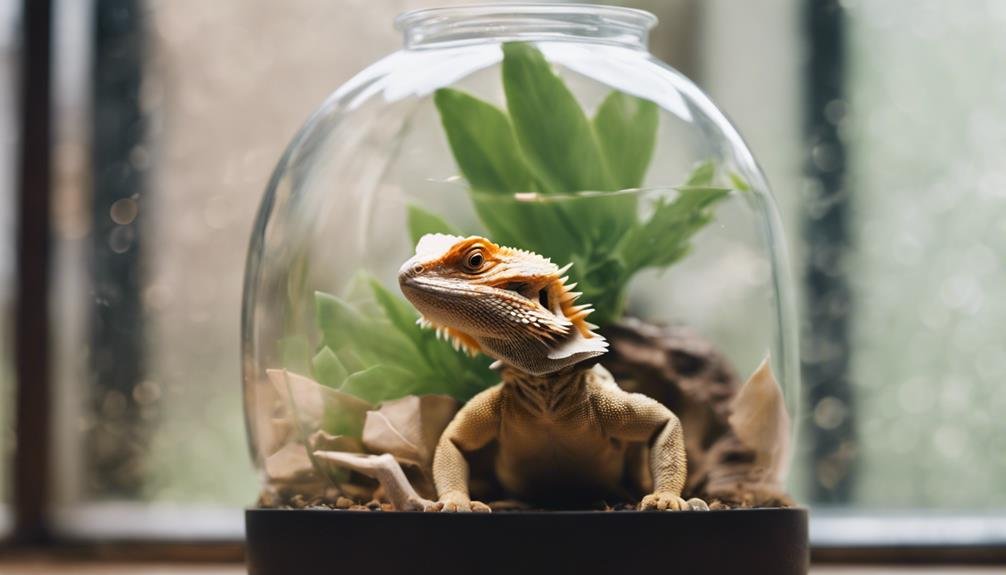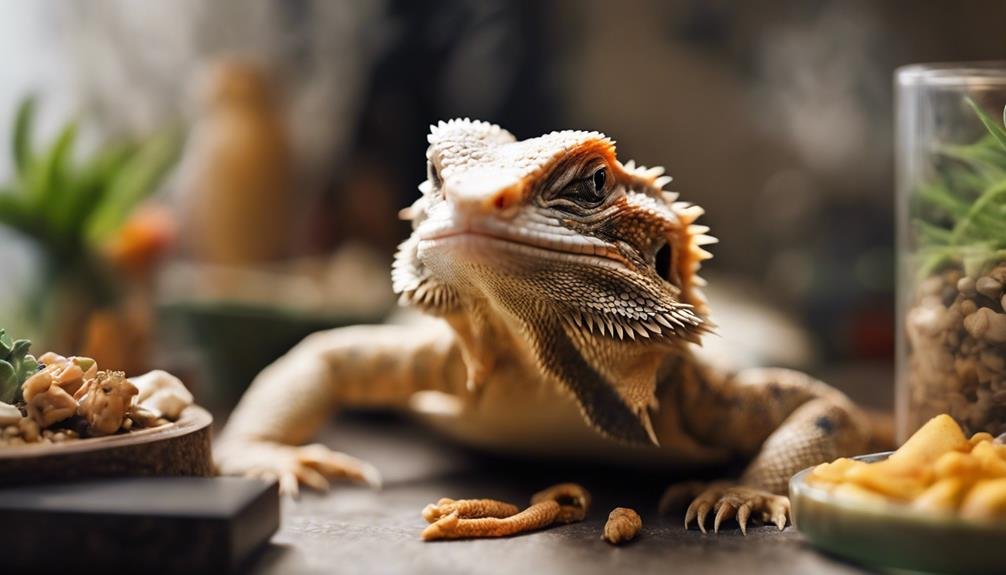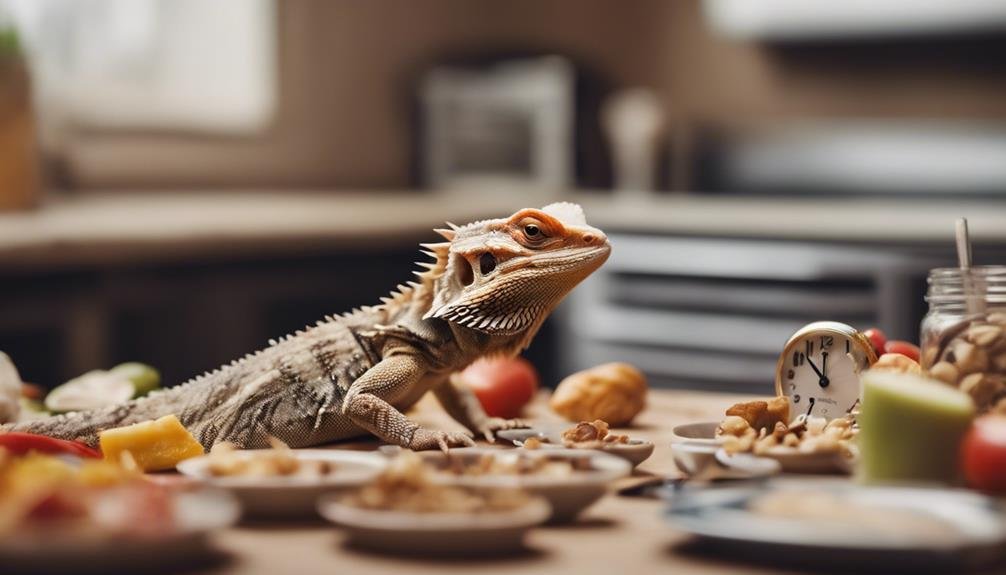As a bearded dragon owner, you're likely familiar with their sometimes perplexing eating habits, ranging from seasonal brumation to outright fussiness. You've observed them go from voracious eaters to showing little interest in food, leaving you to wonder how long they can sustain this without eating. While it's known they can survive for weeks, even months during brumation, the nuances of their fasting, especially due to pickiness, raise concerns about their health and well-being. This discussion invites you to explore the fine line between normal fasting behavior and when it's time to worry, offering insights into managing their dietary needs effectively.
Key Takeaways
- Bearded dragons can survive weeks to months without food, depending on age and health conditions.
- Brumation, a natural dormancy period, can lead to reduced appetite and fasting.
- Fussy eating habits may prolong fasting but can be managed by understanding and offering diverse dietary options.
- Monitoring weight, hydration, and behavior is crucial during prolonged fasting periods to ensure health.
- Providing hydration through baths or water droplets is important to support bearded dragons during fasting.
Understanding Brumation
As temperatures drop, your bearded dragon may start brumation, reducing its activity and metabolism to a great extent. This hibernation-like state is a natural response to seasonal changes, signaling your pet to slow down. During brumation, it's not unusual for your bearded dragon to go for weeks or even months without eating or seeking heat. This dramatic shift in behavior is rooted in their survival instincts, allowing them to conserve energy when conditions aren't favorable.
Understanding the role of vivarium temperatures is important during this period. Even though your bearded dragon is brumating, maintaining a stable environment ensures their well-being. A drop too severe can be harmful, while too warm temperatures might interrupt this natural process. Monitoring and adjusting the vivarium's climate is key to supporting your pet through brumation.
Signs of Fussy Eating
If you've noticed your bearded dragon turning up its nose at its usual fare, you're likely dealing with a fussy eater. Identifying picky behaviors early on can help you manage their dietary preferences more effectively.
Let's explore how you can adjust their meals and environment to encourage a healthier appetite.
Identifying Picky Behaviors
Identifying picky eating behaviors in your bearded dragon involves watching for a critical aversion to specific foods, such as certain insects, vegetables, or fruits. These signs of fussy eating aren't just quirky traits; they can lead to serious nutritional deficiencies if not addressed properly.
You might notice your dragon turning its nose up at anything that's not live insects, showing a strong preference that can challenge the creation of a balanced diet plan. Understanding these preferences is essential.
When your bearded dragon consistently refuses certain types of food, it's not just being difficult. It's communicating its likes and dislikes, which you'll need to carefully take into account to ensure it receives all the necessary nutrients for a healthy life.
Managing Dietary Preferences
To effectively manage your bearded dragon's fussy eating habits, it's important to recognize the signs and understand their underlying causes. Here are key indicators and strategies to address fussy eating:
- Refusing Certain Foods: Your dragon might suddenly turn down foods that were previously favorites, indicating a shift in dietary preferences.
- Disinterest in Feeding: A noticeable lack of enthusiasm during feeding times can signal a problem.
- Weight Loss: Monitoring for any significant weight loss helps identify if the fussy eating is affecting their health.
- Behavior Changes: Any sudden changes in behavior around feeding routines could be a clue.
Adjusting feeding routines and offering a variety of food options are effective ways to manage and accommodate your bearded dragon's changing dietary preferences.
Health Impacts of Fasting


Understanding the health impacts of fasting is vital for bearded dragon owners, as it can lead to significant weight loss and other potential issues if not monitored carefully. While bearded dragons can naturally go without eating for weeks to months during brumation, this prolonged fasting should be approached with caution. The natural slowdown of metabolism during this period doesn't negate the risk of health issues arising from inadequate nutrition and hydration.
To mitigate the risks associated with prolonged fasting, it's essential to keep a close eye on your bearded dragon's weight, hydration levels, and overall behavior. Weight loss is a clear sign that your pet may not be coping well with the fasting period. Even during brumation, providing occasional hydration can help prevent dehydration and support your dragon's health. Monitoring these aspects closely allows you to intervene when necessary, ensuring your bearded dragon remains healthy throughout periods of reduced food intake.
Duration Without Food
Bearded dragons can endure several weeks to months without food during brumation, a fact that might surprise many owners. This hibernation-like state slows their metabolism, allowing them to survive on their body reserves. But it's not just during brumation; young dragons might also experience prolonged fasting periods, even when they're not in this dormant phase.
Here's what you need to keep in mind about your bearded dragon's capacity for going without food:
- Brumation can trigger a lengthy fasting period where your bearded dragon mightn't eat for months, yet remain healthy.
- Young dragons may also exhibit prolonged fasting periods outside of brumation, which is a critical time to monitor their health.
- Health issues could be a reason your bearded dragon isn't eating. It's important to observe for any signs of illness or discomfort.
- Monitoring weight loss during these times is vital. While some weight loss is expected, excessive loss might indicate health problems.
Even during these fasting periods, providing occasional hydration and nutrients can help support your dragon's health. Ensuring they receive adequate water, either through drinking or misting, can prevent dehydration and complement their limited diet during prolonged fasting.
Managing Dietary Preferences


Understanding your bearded dragon's favorite foods is crucial to managing their dietary preferences effectively. You'll need to guarantee variety in their diet to address any nutritional gaps and maintain their health.
Additionally, supplementing their meals with essential nutrients can help when they're being particularly choosy.
Identifying Favorite Foods
To identify your bearded dragon's favorite foods, observe which items they consistently choose to eat. Bearded dragons may develop dietary preferences for certain foods over time, and understanding these can be vital in offering a varied diet they'll readily consume.
Here's how you can manage their dietary preferences effectively:
- Monitor Eating Habits: Note which foods your dragon seems to favor during meal times.
- Offer a Variety: Regularly rotate their food options to prevent overreliance on one food type.
- Understand Nutritional Needs: Make sure their favorite foods contribute to their nutritional balance.
- Adjust as Necessary: Be ready to adapt their diet to maintain overall health.
Addressing Dietary Variability
Addressing dietary variability in your bearded dragon's meals can greatly enhance their overall health and satisfaction. Bearded dragons may turn up their noses at certain foods due to dietary preferences or dislikes. By offering a variety of insects, vegetables, and fruits, you're not just catering to their tastes but ensuring they receive a balanced diet.
Some may develop a liking for specific foods over time. To keep their diet interesting and encourage eating, rotate food options and experiment with different textures. Understanding and respecting individual preferences is key. Adjusting their diet to include their favorites, while still ensuring they get the necessary nutrition levels, can make all the difference in maintaining a healthy, happy bearded dragon.
Supplementing Nutritional Gaps
Supplementing nutritional gaps in your bearded dragon's diet is essential for bridging the gap between their dietary preferences and their nutritional needs. During brumation, your reptile may not eat for weeks to months, making it vital to address these gaps when they resume eating. Here's how you can guarantee their diet remains high in essential nutrients:
- Offer a variety of feeder insects and vegetables to cater to their dietary preferences while filling nutritional gaps.
- Provide occasional superworms for hydration and additional nutrition during reduced eating periods.
- Experiment with different foods to manage picky eating habits, ensuring they receive a balanced diet.
- Monitor their weight and overall health closely to adjust their diet as needed, making sure their well-being is always a top priority.
Preventing Unnecessary Fasting


While it's natural for bearded dragons to fast, especially during brumation, you can take steps to prevent unnecessary fasting that might harm their health. Understanding the balance between natural fasting periods, like brumation, and prolonged fasting due to stress, illness, or environmental changes is key. Monitoring your bearded dragon's weight and overall health becomes important to distinguish between a healthy fast and one that could signal problems.
To mitigate unnecessary fasting, first make sure their habitat mimics their natural environment as closely as possible. This includes maintaining proper temperatures, lighting, and humidity levels to reduce stress-induced fasting. Be vigilant for signs of illness and act promptly by consulting a reptile veterinarian if you suspect your pet is unwell.
Additionally, providing hydration through occasional baths or water droplets can support your bearded dragon during fasting periods, especially if they're refusing food but still need to stay hydrated. Remember, while fasting can be normal, especially during brumation, it's vital to be proactive in preventing prolonged fasting that isn't part of their natural cycle. Monitoring and adjusting care as needed can help keep your bearded dragon healthy and minimize unnecessary fasting.
Can Diseases in Bearded Dragons Cause them to Stop Eating?
Bearded dragon diseases explained can definitely cause them to stop eating. Common illnesses like metabolic bone disease and yellow fungus can affect their appetite. Infections, parasites, and mouth rot can also lead to loss of appetite. Regular check-ups and proper care can help prevent these issues.
Frequently Asked Questions
How Long Can Bearded Dragons Go Without Eating During Brumation?
Your bearded dragon can skip meals for weeks to months during brumation, thanks to their fat reserves. It's essential to keep an eye on their weight and make sure they're healthy.
Adjusting their habitat for the right temperature and providing occasional hydration are key. After brumation, you'll need to reintroduce food slowly.
How Do You Know if Your Bearded Dragon Is Dying?
If your bearded dragon's showing signs of illness like extreme lethargy, appetite changes, or skin discoloration, it might be dying. Look out for unusual behavior, such as constant hiding or not reacting to things they usually would.
These symptoms, including visible bones or sunken eyes, indicate serious health issues. Don't wait; get them to a vet ASAP. Early detection and treatment can sometimes turn things around.
Why Is My Bearded Dragon Acting Weird After Brumation?
Your bearded dragon's weird behavior after brumation is likely due to post-brumation changes. They're adjusting to being active again, which can mess with their appetite and how they act.
To help them out, you'll want to tweak their lighting and temperature settings to get things just right. Also, adding some environmental enrichment can make a big difference.
Keep a close eye on them to catch any serious issues early on.
How Do I Get My Bearded Dragon to Eat After Brumation?
To get your bearded dragon eating after brumation, start by offering live food like crickets or mealworms. Adjusting temperatures in their habitat can also stimulate their appetite.
Try incorporating habitat enrichment to make their space more engaging and introduce a dietary variety to pique their interest.
Gentle handling may reassure them and encourage eating. If they're still fussy, mix up the menu and make sure their environment is as comfortable as possible.
Conclusion
So, you've seen your bearded dragon go from a chowhound to a fasting monk, thanks to brumation or pickiness.
Remember, while it's normal for them to skip meals for weeks or even months, your job's to keep an eye on their health. Offer them water and essential nutrients to sidestep any health risks.
Understanding and adapting to their dietary quirks is key. Don't let their fasting worry you too much, but don't ignore it either. Stay vigilant, and they'll thrive.

